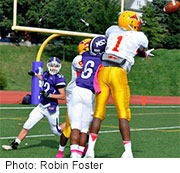- Could Your Grocery Store Meat Be Causing Recurring UTIs?
- Are You Making This Expensive Thermostat Error This Winter?
- Recognizing the Signs of Hypothyroidism
- 10 Strategies to Overcome Insomnia
- Could Artificial Sweeteners Be Aging the Brain Faster?
- Techniques for Soothing Your Nervous System
- Does the Water in Your House Smell Funny? Here’s Why
- Can a Daily Dose of Apple Cider Vinegar Actually Aid Weight Loss?
- 6 Health Beverages That Can Actually Spike Your Blood Sugar
- Treatment Options for Social Anxiety Disorder
Parents Need to Take Lead on Teen Concussion Prevention


Parents need to take an active role in protecting their children from sports concussions, an expert warns.
Parents must make sure sports-playing teens have the right protective gear and undergo standard, Dr. David Dodick, chair of the American Migraine Foundation and a professor of medicine at the Mayo Clinic College of Medicine in Scottsdale, Ariz. in an American Migraine Foundation, said in a foundation news release.
Any coach involved with teens sports needs to have appropriate training. Teen sports teams need concussion sideline and after-injury protocol, said Dodick. He also advised that there should be either a health professional available at games to evaluate blows to the head, or a safety officer who can give simple tests to determine if an athlete has suffered a concussion.
It’s also important to make sure that schools forbid students with concussions from playing and don’t allow them to return to play until cleared by a concussion specialist, Dodick said.
Teens need to understand how serious a concussion can be. Parents should also make sure their teen knows the signs and symptoms of concussion, which include nausea and vomiting, dizziness, confusion, headache, slowed thinking, memory loss, insomnia or excessive sleeping, irritability/depression or mood swings, and sensitivity to light and/or noise.
If your child has any of these symptoms after a head injury, see a doctor immediately, said Dodick, who noted that symptoms can worsen over hours or days.
Another way to reduce children’s risk of concussion is for them to play with others who are similar in height, weight, strength and level of training.
More information
The American Academy of Family Physicians has more about concussion.
Source: HealthDay
Copyright © 2026 HealthDay. All rights reserved.










